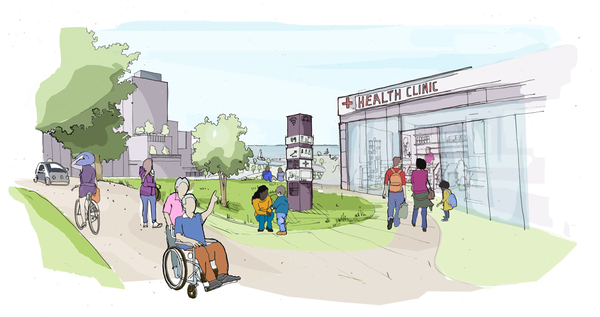Image Source - (Sidewalk Labs)
With half of the world’s population living in urban areas and the rapid evolution of technology, it’s not surprising that we continue to hear quite a bit of buzz in the media that there is a global shift towards “smart cities” as the future of urban development. Just what a smart city is exactly is difficult to define because it takes on a different meaning based on the city’s overall goal. From a citizen’s perspective, we can define the ideal smart city as a place that incorporates technology to make city life more accessible and efficient, without feeling like technology is present. The real question is then: accessible for who?
Innovations in technology over the last decade have become a means to empower individuals with disabilities by becoming a tool for independence. We are hoping to see this translate into the blueprint of smart cities as they begin to pop up in developed and emerging nations. Picture a city that’s completely hands-free. Imagine shopping malls and retail stores, schools, corporate offices, medical buildings and more were all fully accessible through mobile applications, voice commands, and mandatory automatic doors.

Toronto is slated to be the first smart city in Canada thanks to Alphabet's (Google's owner) Sidewalk Labs. The project’s mission is to “blend people-centred urban design with cutting-edge technology to achieve new standards of sustainability, affordability, mobility, and economic opportunity.” The emphasis on “mobility” is the first piece of evidence that smart cities will be more accessible than the current standard. Sidewalk Labs also states “more accessible community hubs” as an outcome of its current plan. It’s safe to say we have high hopes for seeing more examples of Universal Design like Toronto’s future smart city being implemented in all countries adopting the new model of urban development.

Image Source - (Smart Cities for All)
Microsoft is doing its part as a leader in accessibility in the technology industry by empowering civic leaders to ensure that citizens with disabilities are included in reaping the benefits of Smart Cities. After witnessing the issues in current Smart City models, the company has created the Smart Cities for All initiative with G3ict and World Enabled to “define the state of accessible technology in cities worldwide with a focus on closing the digital divide for people with disabilities and older people.” If Microsoft is successful in encouraging developers, investors, and planners to adopt the toolkit into their Smart City plans, the image of a hands-free, interactive and citizen-centric metropolis will be more likely to become a reality.
Learn more about how tecla-e can work with your smart home system and give you the freedom to control your world.


2 comments
Oct 05, 2018 • Posted by John B. Reilly
“Radical Inclusion” is such a great term, someday radical will be standard, as is so often the case in history, and then we’ll be able to focus on other super important stuff! I’ve had the pleasure of taking friends who use powered mobility to rock and jamgrass concerts and festivals. To me, not so rad, very standard for fun. But for them, getting VIP passes cuz we asked about accessibility was life changing awesome. Speak up and go for it always I say, “life is short, make it sweet”, build a smart city! No one is going to do it for us, one great idea at a time, focus on the poz. and we’ll get there together, and more importantly, for the next gen which may very well be us, me, you. We will all have a physical &/or cognitive challenge, unless we die first.
Oct 01, 2018 • Posted by Jake Hamoen, P.Eng.
Great Expectations eh Pip!
I am a quadriplegic that uses a power wheelchair with a joystick
I also operate my computer with reflectors on my glasses that work with a camera on the computer.
As a result I am working on my book, Breathe, about my experiences. I also watch Netflix and YouTube movies, political commentary, and baseball. I also do energy analyses for buildings in order to save them significant money on their electrical bills.
The concept of smart cities is a very noble task worthy of serious consideration.
Leave a comment: